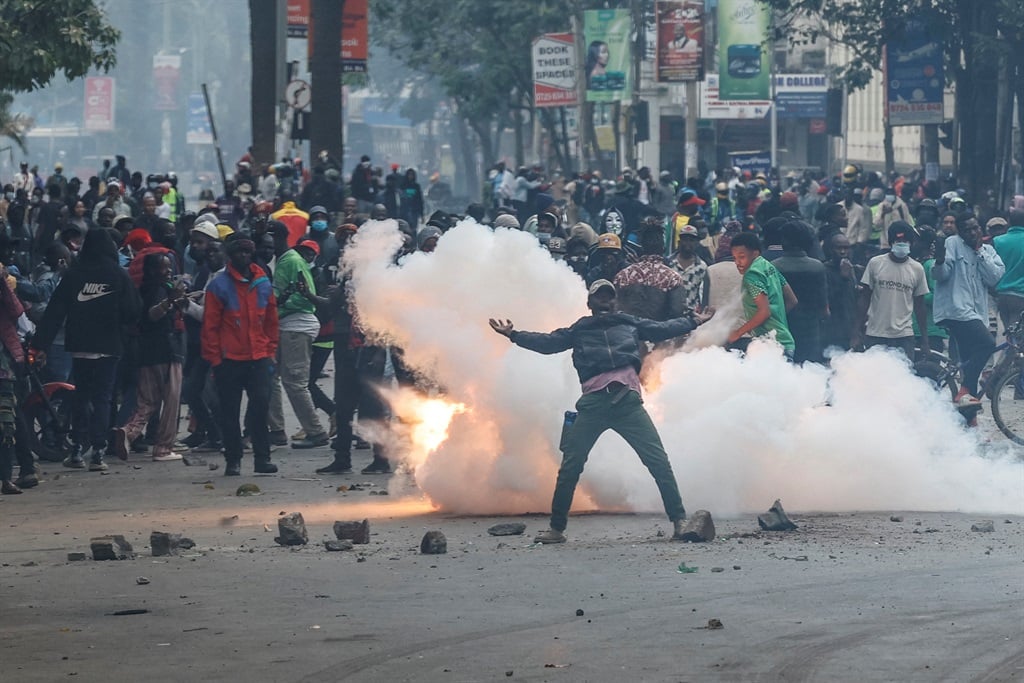NAIROBI, KENYA — Kenya’s High Court on Thursday suspended a police ban on protests in the capital, stating citizens have a right to demonstrate peacefully.
Before the high court’s decision, police had barred protests in Nairobi indefinitely, saying they lacked leadership that would ensure peaceful demonstrations..
The suspension of the ban came before a planned protest, in which demonstrators were expected to march to the president’s office calling for his resignation over poor governance.
Acting police inspector general, Douglas Kanja, in a statement said the lack of leadership had “made it difficult to enforce safety protocols.”
Recent protests have left businesses counting losses after the lootings and burnings.
Protests were yet to be seen Thursday, but major roads leading to the president’s office remained barricaded by the police.
Kenya has seen a month of protests that started with calls for legislators to vote against a controversial finance bill that proposed higher taxes amid a cost-of-living crisis and ballooning public debt.
At least 50 people have died since the protests began on June 18, according to the Kenya National Commission on Human Rights.
President William Ruto said he wouldn’t sign the finance bill that was passed by parliament on June 25 — the day protesters stormed and burned part of the building, prompting legislators to flee. The president last week dismissed almost his entire Cabinet and the attorney general, as demanded by protesters who accused ministers of incompetence, corruption and display of opulence.
The U.S. Embassy in Nairobi on Thursday urged police to protect the right of Kenyans to demonstrate and encouraged the government to “continue taking steps forward” toward national unity and reconciliation.
Some businesses in Nairobi remained closed in anticipation of protests Thursday. Police remained heavily deployed around the central business district patrolling the streets.
Government spokesperson Isaac Mwaura on Thursday said the economy had incurred loses worth 6 billion Kenyan shillings ($45 million) because of ongoing monthlong protests.
Police have been accused of brutality against protesters. Japhet Koome, the former inspector general of police, resigned on July 12 after calls from demonstrators for him to take responsibility for the shooting of protesters.
The Independent Policing Oversight Authority on Wednesday said it had forwarded four of 10 cases of police brutality to the director of public prosecutions with recommendations.
The watchdog had recorded witness statements and directed that various police officers to appear before it to give their testimony.
Kenyan police officers have in the past been accused of brutality and a contingent of 400 officers is currently in the Caribbean nation of Haiti leading a U.N.-backed police mission to combat gang violence.
Police hurled tear gas canisters on Tuesday to break up protests in Nairobi and several other towns and cities accusing the president of poor governance and demanding his resignation, despite his dismissal of nearly the entire Cabinet last week.
Businesses in Nairobi remained closed for fear of a repeat of the looting that occurred during demonstrations last week, when protesters stormed into Parliament and several were killed by police.
Demonstrators blocked major roads including the highway to Namanga on the outskirts of Nairobi, where they lit bonfires on Tuesday morning. Demonstrations were also reported in the towns of Mombasa, Kisumu and Eldoret.
The protests came five days after President William Ruto dismissed all but one Cabinet minister and promised to form a broad-based, lean and efficient government in response to the protesters’ demands.
Protests began on June 18 calling for the sacking of Cabinet ministers over incompetence, corruption and displays of opulence while ordinary people suffered from a cost-of-living crisis. Protesters stormed parliament on June 25 after legislators passed a finance bill that would raise taxes. Police opened fire, killing several people.
Activists who have been urging people to join the protests say they are spontaneous and no group is leading or funding them.
One protester, Daniel Wambua, on Tuesday said the president has not adequately addressed governance issues raised by those demonstrating.
“We are asking genuine questions. Where is accountability? Where is governance?” he said.
